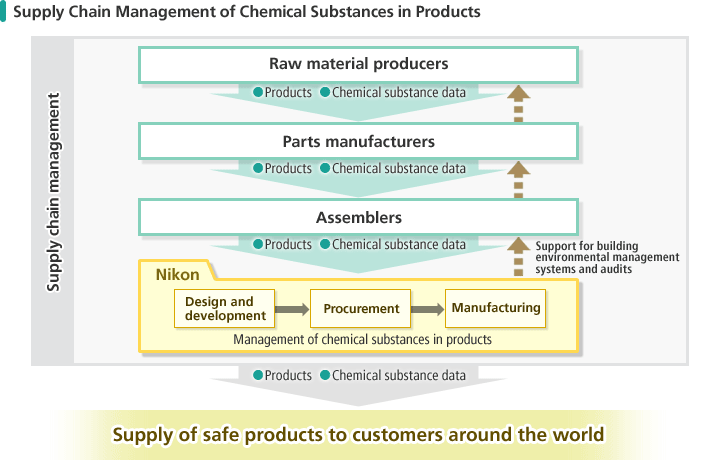CSR-oriented Procurement

To ensure the soundness of its business activities, the Nikon Group cooperates with its procurement partners to undertake CSR-oriented procurement and green procurement.
Basic procurement policy
The Nikon Group procures materials from suppliers in a sincere and fair manner based on the Nikon Basic Procurement Policy. The aim of this is to continue providing customers with products that meet their needs while also building up a more desirable society and global environment and realizing the sustainable development of our corporation. Based on this policy, we have established the Nikon Procurement Partners' CSR Guidelines for tackling our social responsibility along the entire length of the supply chain. In addition, we have also established the Nikon Green Procurement Standards for procuring environmentally friendly parts and materials.
Within Nikon Group companies in Japan, we have established the Procurement Communication Conference and its subordinate organization, the CSR Procurement Conference, as cross-organizational councils for the promotion of CSR-oriented procurement. With respect to green procurement, we have also established the Green Procurement Subcommittee and the Green Procurement Conference, where we hold concrete discussions and examine, implement and monitor the progress of policies on green procurement.
In addition to these, the Procurement Planning Section of the Procurement & Facilities Management Department, which acts as the secretariat for the Procurement Communication Conference, has participated in the Supply Chain Sub-Committee of the UN Global Compact Japan Network since the year ended March 31, 2009. As well as striving to gain an understanding of the latest in CSR-oriented procurement activities in supply chains, the Procurement Planning Section also takes part in discussion on CSR-oriented procurement regarded as ideal by the participating companies.
Promoting CSR-oriented procurement
CSR-oriented procurement activities in Japan
The Nikon Group established the Nikon Procurement Partners' CSR Guidelines in 2007 for the purpose of tackling its social responsibility along the entire length of the supply chain. Between 2008 and 2009, we held briefings for our procurement partners in Japan, and we conducted our first CSR survey. Since 2010, we have conducted interview surveys designed to ascertain the CSR activities of our procurement partners, and we have promoted CSR in the supply chain in a step-by-step manner.
In the year ended March 31, 2012, we conducted our second CSR survey on 1,243 of our procurement partners in Japan (return rate: 86%). We also examined the idea of conducting on-site inspections to get a more reliable confirmation of the CSR activities of our procurement partners in the supply chain. At first, we were considering standardizing our existing guidelines and making them consistent with our Green Procurement Standards, before incorporating on-site inspections into our basic transaction agreements. Instead, though, we decided to go ahead with on-site inspections and to shelve the standardization and contractual inclusion ideas at this stage. In order to verify the CSR activities of our procurement partners in more detail, we also decided to expand our existing interviews and conduct on-site inspections using a check sheet that looks at more of the specifics of our procurement partners' activities.
During the year ending March 31, 2013, before carrying out the on-site inspections, we will select which companies will conduct the inspections and we will develop an implementation system covering inspectors, schedules and so forth. At the same time, we will keep looking into including CSR requirements into the basic transaction agreement, and we will promote compliance with the Nikon Procurement Partners' CSR Guidelines.
With regard to basic transaction agreements, we utilize a common format for Nikon Group companies in Japan, and we encourage them to ensure they sign the agreement with their procurement partners. In cooperation with the Legal Affairs Department, the Intellectual Property Department and each of the procurement departments, the content of the agreement is reviewed periodically and revisions made as needed, thereby ensuring appropriate transactions are carried out.
CSR-oriented procurement overseas

A briefing given to procurement partners in Nanjing, China
During the year ended March 31, 2012, we concentrated on the promotion of CSR in our overseas supply chain. Three overseas Group companies which are mainly manufacturing bases in Asia were given briefings for the purpose of permeating CSR-oriented procurement within each company. We also held briefings on the Nikon Procurement Partners' CSR Guidelines and conducted a CSR survey on 90 overseas procurement partners. Compared with our procurement partners in Japan, the results of the survey showed better trends in all areas except for the environment. Although this disparity was, in part, influenced by the relatively large survey sample in Japan, we found that overseas procurement partners also tended to rate themselves higher. With respect to human rights and other areas, there may have also been differences in definitions of certain terms. With these points in mind, we will continue to properly promote CSR.
Based on the results of the surveys and in consultation with the departments in charge of CSR at each overseas Group company, during the year ending March 31, 2013, we will identify issues, and examine and implement measures that lead to a greater promotion of CSR-oriented procurement overseas.

Addressing the issue of "conflict minerals"
The term "conflict minerals" refers to the minerals (tantalum, tin, tungsten, gold) mined in areas of conflict in the Democratic Republic of the Congo and neighboring countries. They are called this because they incite serious problems such as violations of human rights and destruction of the environment and because they serve as a source of funds for armed insurgents. International efforts have been mounted to resolve these problems. The Nikon Group has also adopted a basic policy of doing all it can to not use conflict minerals. For instance, in cooperation with our procurement partners, we conduct surveys on the use of minerals.
In the year ended March 31, 2012, we revised the Nikon Procurement Partners' CSR Guidelines to include policy on the conflict minerals issue under the "Respect for Human Beings," and we explained this to our procurement partners. In addition, we surveyed 1,243 procurement partners in Japan on their usage of conflict minerals, receiving responses from 920 companies (return rate: 74%). We also conducted a similar survey on our overseas procurement partners, and received responses from 208 companies.
During the year ended March 31, 2013, in addition to sharing the results of these surveys with the procurement departments of Nikon Group companies, we endeavored to increase the accuracy of the surveys, such as by verifying individual responses and promoting awareness where necessary. Going forward, we will continue to survey our procurement partners, while reviewing the form and content of the surveys.
Based on the Nikon Basic Procurement Policy and the Nikon Procurement Partners' CSR Guidelines, the Nikon Group will continue to strive to fulfill its social responsibilities along its supply chain with regard to the conflict minerals issue.
Promoting green procurement
The Nikon Group has established the Green Procurement Standards for procuring environmentally friendly parts and materials, and promotes them along the entire length of the supply chain. In recent years, compliance with regulations on chemical substances in products, such as the European RoHS Directive* and European REACH Regulation*, has become a key issue, and we have worked to enhance our management system.
There are strong calls for the management of hazardous chemical substances (chemical substances in products) because of the concerns about them being released into the environment when the products are disposed of. Managing hazardous chemical substances contained in Nikon products is not easy because the products are manufactured from materials and parts that are procured and manufactured along a complex supply chain. Therefore, the cooperation of our procurement partners is essential. We aim to build a system at the Nikon Group which manages chemical substances in products throughout the supply chain.
Revision of the Green Procurement Standards
Every year, we review the Green Procurement Standards, and examine whether any revisions are needed.
During the year ended March 31, 2012, at a meeting of relevant departments to examine revisions to the Green Procurement Standards, it was decided to revise the applicable scope, add six new substances to the prohibited chemical substances in manufacturing processes, and to add the lists of applications exempted from the RoHS Directive and SVHCs under the REACH Regulation to the annexes. The revisions came into force on April 1, 2012.
Establishment of environmental management systems throughout the supply chain
The Nikon Group has been requesting procurement partners since the year ended March 31, 2010 to establish and operate environmental management systems based on the Nikon Green Procurement Standards. Environmental management systems are comprised of a management system of environmental protection and a management system of chemical substances in products.
Past increases in awareness for global environmental conservation means that there is already a shared awareness for the need for systems for managing environmental protection. As such, many of our suppliers have already obtained certification, such as ISO 14001 and Eco-Action 21. On the other hand, as for systems for managing chemical substances in products, while suppliers might answer if questioned about chemical substances, the fact is that there are more cases of suppliers without any system for managing chemical substances, from purchasing and production control through to quality control. We will pursue further improvements by surveying and auditing our procurement partners' environmental management system, and by providing support for them to establish systems.
Survey and audit of environmental management systems
In addition to requesting the establishment and operation of environmental management systems, we have also been conducting surveys and audits on those systems since the year ended March 31, 2010. We conduct questionnaire-based surveys on all procurement partners and then carry out on-site audits. Partners, who we find to have outstanding management systems, are then certified as Nikon Environmental Partners.
During the year ended March 31, 2012, we surveyed 798 procurement partners in Japan and 35 overseas procurement partners. We also audited 66 procurement partners in Japan and 11 overseas procurement partners. Furthermore, we also conducted mock audits and provided auditor training to three overseas Group companies. The audits determined that seven companies are properly operating environmental management systems, while 73 companies were asked to rectify their systems or operation of those systems. Five additional companies were certified as Nikon environment partners, bringing the total to 21. In the year ended March 2012, support for the development of management systems was provided to 12 additional procurement partners who either had no systems or whose systems were inadequate.
In the year ending March 31, 2013, we will work to promote green procurement by auditing 150 procurement partners in Japan and overseas.
System of environmental management system auditing
During the year ended March 31, 2012, in an effort to equalize the level of audits, we provided training for environmental management system auditors working at Group companies in Japan and overseas. We also endeavored to expand the audit system. Going forward, we plan to methodically advance the audit system, including environmental management system audits of the procurement partners of overseas Group companies.

- *RoHS Directive
"RoHS" stands for "Restriction of Hazardous Substances." This directive was adopted by the EU in 2003. It restricts the use of certain hazardous chemical substances in electrical and electronic equipment with a view to minimizing the risks that these substances pose to the environment and human health.
- *REACH Regulation
A regulation on chemical substances issued by the European Union (EU) in 2007. "REACH" stands for the "Registration, Evaluation, Authorization, and restriction of Chemicals," and manufacturers and importers of chemical substances are mandated to register information on the safety and use of these substances under the regulation.
Relative Information
- Procurement
The Nikon Group procures materials from suppliers in a sincere and fair manner based on the Nikon Basic Procurement Policy.
